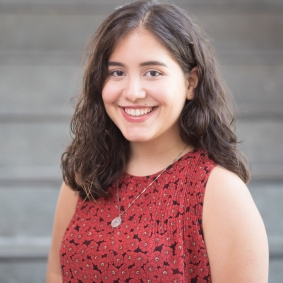Knauss legislative fellowships in Congress help build careers — and they're fun and educational. See our video and fact sheet for details.
Zoraida Pérez Delgado

Start Year:
2019Zoraida P. Pérez Delgado is working as the Special Assistant to the Assistant Administrator at NOAA’s Office of Oceanic and Atmospheric Research. She will be working with a diverse portfolio touching on the themes of climate, oceans, weather, and coasts.
Born and raised in Puerto Rico, Pérez Delgado obtained her bachelor’s degree in environmental science at the School of Science and Technology at Universidad Metropolitana in San Juan, Puerto Rico. She moved to the continental US to pursue an M.S. degree in the Marine Estuarine and Environmental Science Graduate Program at the University of Maryland Center for Environmental Science’s Chesapeake Biological Laboratory (CBL) focusing on the area of paleoclimatology. For her thesis, she used coral geochemical records from the Atlantic, Indian, and the Pacific oceans to understand better how temperature and precipitation patterns changed after strong volcanic eruptions during the last 400 years.
During her graduate studies, she volunteered at her campus visitor center and participated in CBL’s annual Open House, engaging with the public and sharing the importance of her research. She was also the President of the American Association of University Women–CBL Chapter. The group discussed various topics of member interest, with diversity and cultural interactions in science as a recurring theme. In her free time, she enjoys traveling, dancing, working on DIY and interior design projects, and going to concerts.
Call for Symposium Presenters and Authors
The Chesapeake Rising: Innovative Law and Policy Solutions for Climate Adaptation in Coastal Communities symposium will explore key legal and policy considerations that affect climate adaptation strategies. It provides a unique opportunity for upper-level law students and early-career lawyers to present and publish their legal scholarship.
Program Announcements
-
-
Maryland Sea Grant has program development funds for start-up efforts, graduate student research, or strategic support for emerging areas of research. Apply here.
News and Blogs
Video Gallery
Sea Grant Film Explores a Diminishing Smithville
Smithville is a community on Maryland’s Eastern Shore, on the edge of the Blackwater National Wildlife Refuge. A century ago, Smithville had more than 100 residents. Today, it has four, in two homes: an elderly couple, and one elderly woman and her son, who cares for her.
Featured Fellow
Featured Research Project
Developing a habitat model for mysids, an important link in Chesapeake Bay food webs
Mysids are important mesozooplankton prey for many species of fish in Chesapeake Bay and are an important link in transferring energy from lower to upper trophic levels. Mysids also serve as biological vectors for benthic-pelagic coupling due to their diel vertical migration and omnivorous prey-switching behavior, which makes mysids important regulators of food web architecture. Despite their central role in coastal food webs, surprisingly little is known about mysid ecology and dynamics in Chesapeake Bay.
The Blue Crab: Callinectes Sapidus
An essential resource for researchers, students, and managers. Get your copy today!


©2025 Maryland Sea Grant. All rights reserved.
5825 University Research Court, Suite 1350 | College Park, MD 20740
Phone: (301) 405-7500 | Fax: (301) 314-5780 | Contact Us



